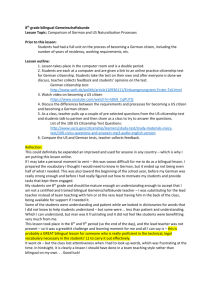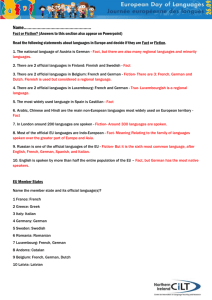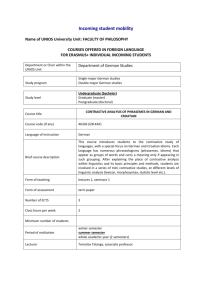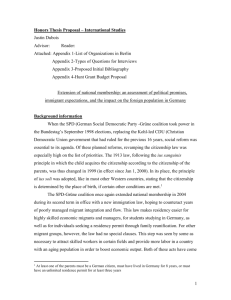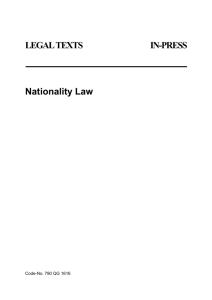BABILONCROCKETT_AQCI_1
advertisement
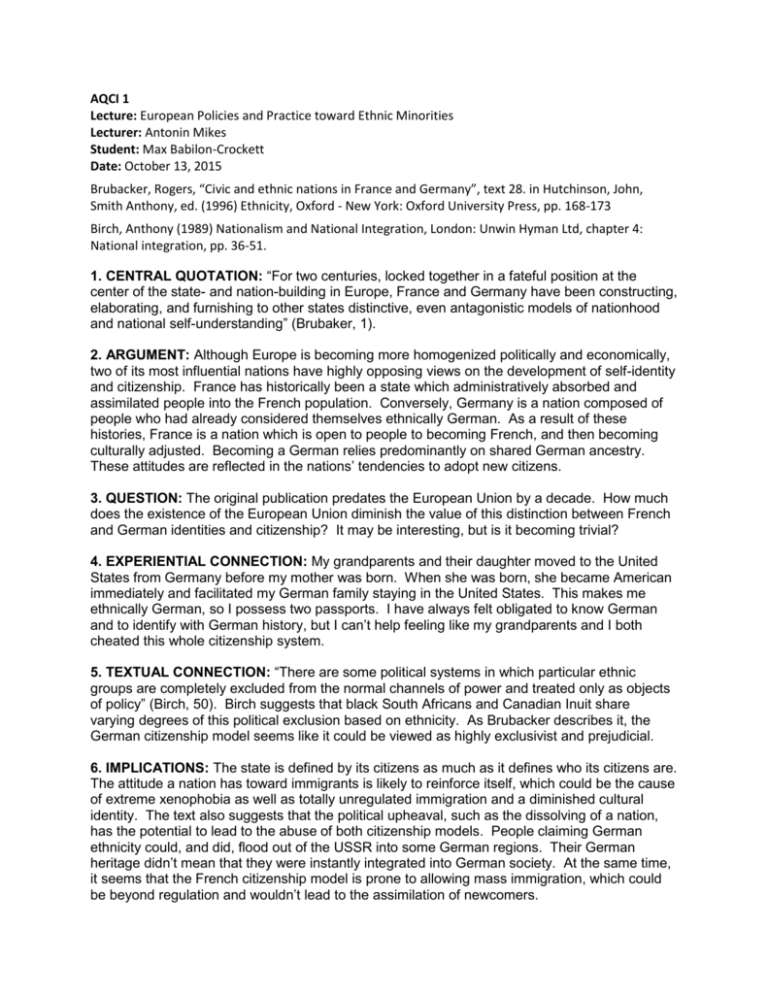
AQCI 1 Lecture: European Policies and Practice toward Ethnic Minorities Lecturer: Antonin Mikes Student: Max Babilon-Crockett Date: October 13, 2015 Brubacker, Rogers, “Civic and ethnic nations in France and Germany”, text 28. in Hutchinson, John, Smith Anthony, ed. (1996) Ethnicity, Oxford - New York: Oxford University Press, pp. 168-173 Birch, Anthony (1989) Nationalism and National Integration, London: Unwin Hyman Ltd, chapter 4: National integration, pp. 36-51. 1. CENTRAL QUOTATION: “For two centuries, locked together in a fateful position at the center of the state- and nation-building in Europe, France and Germany have been constructing, elaborating, and furnishing to other states distinctive, even antagonistic models of nationhood and national self-understanding” (Brubaker, 1). 2. ARGUMENT: Although Europe is becoming more homogenized politically and economically, two of its most influential nations have highly opposing views on the development of self-identity and citizenship. France has historically been a state which administratively absorbed and assimilated people into the French population. Conversely, Germany is a nation composed of people who had already considered themselves ethnically German. As a result of these histories, France is a nation which is open to people to becoming French, and then becoming culturally adjusted. Becoming a German relies predominantly on shared German ancestry. These attitudes are reflected in the nations’ tendencies to adopt new citizens. 3. QUESTION: The original publication predates the European Union by a decade. How much does the existence of the European Union diminish the value of this distinction between French and German identities and citizenship? It may be interesting, but is it becoming trivial? 4. EXPERIENTIAL CONNECTION: My grandparents and their daughter moved to the United States from Germany before my mother was born. When she was born, she became American immediately and facilitated my German family staying in the United States. This makes me ethnically German, so I possess two passports. I have always felt obligated to know German and to identify with German history, but I can’t help feeling like my grandparents and I both cheated this whole citizenship system. 5. TEXTUAL CONNECTION: “There are some political systems in which particular ethnic groups are completely excluded from the normal channels of power and treated only as objects of policy” (Birch, 50). Birch suggests that black South Africans and Canadian Inuit share varying degrees of this political exclusion based on ethnicity. As Brubacker describes it, the German citizenship model seems like it could be viewed as highly exclusivist and prejudicial. 6. IMPLICATIONS: The state is defined by its citizens as much as it defines who its citizens are. The attitude a nation has toward immigrants is likely to reinforce itself, which could be the cause of extreme xenophobia as well as totally unregulated immigration and a diminished cultural identity. The text also suggests that the political upheaval, such as the dissolving of a nation, has the potential to lead to the abuse of both citizenship models. People claiming German ethnicity could, and did, flood out of the USSR into some German regions. Their German heritage didn’t mean that they were instantly integrated into German society. At the same time, it seems that the French citizenship model is prone to allowing mass immigration, which could be beyond regulation and wouldn’t lead to the assimilation of newcomers. AQCI ASSESSMENT FORM Student’s name: Max Babilon-Crockett Essay title: AQCI 1 Name of assessor: Excel lent 1) Is the chosen quotation central to the author’s argument? Go od Kelsey Beckmeyer Aver age Not accept able 13.10.15 Comments X The quote relates to the central argument, but doesn’t fully highlight the differences in the practices of each state. Very nice overview of the argument as a whole. Clear and concise. X Interesting question. Does the EU mean that individual countries lose their own identity as a nation or more so enhance the political relationships in Europe? There is a lot to explore within your question. Since the text is from before the EU, there is no exploration of this dynamic. If German citizenship is based on ethnicity, wouldn’t you have met the criteria? What makes you feel like you cheated? X 2) Has the main argument been fully understood (including its ‘for’ and ‘against’ sides, if applicable)? 3a) Is the question raised important/relevant/interesting? 3b) Has this question not been fully answered in the text? Po or Date: X X 4) Is the experiential connection relevant/interesting? X 5a) Is the textual connection relevant/interesting? 5b) Has it been cited properly? 5c) Has it been adequately explained how the present text's argument contrasts with, contradicts, confirms, clarifies, or elaborates the other text's argument or point? X X X 6) Have the implications been well understood, can they have a practical impact for policy making? Are there further examples of ethnic minorities in Germany that could support your connect? The implications mentioned are thoughtful and align with the text. They raise good commentary on what to consider about immigration and citizenship policy. 7) Expression/Presentation a) Are the style, grammar and general use of English adequate? b) Is the AQCI professionally presented? Essay grade: Further comments: X X

